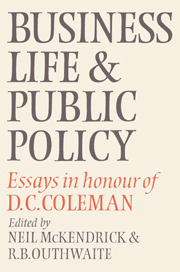Book contents
- Frontmatter
- Contents
- Preface
- List of contributors
- 1 Piscatorial politics in the early Parliaments of Elizabeth I
- 2 Marriage as business: opinions on the rise in aristocratic bridal portions in early modern England
- 3 Age and accumulation in the London business community, 1665–1720
- 4 The use and abuse of credit in eighteenth-century England
- 5 Convicts, commerce and sovereignty: the forces behind the early settlement of Australia
- 6 ‘Gentleman and Players’ revisited: the gentlemanly ideal, the business ideal and the professional ideal in English literary culture
- 7 The City, entrepreneurship and insurance: two pioneers in invisible exports – the Phoenix Fire Office and the Royal of Liverpool, 1800–90
- 8 ‘At the head of all the new professions’: the engineer in Victorian society
- 9 Bernard Shaw, Bertold Brecht and the businessman in literature
- 10 Lost opportunities: British business and businessmen during the First World War
- 11 Ideology or pragmatism? The nationalization of coal, 1916–46
- Bibliography of D. C. Coleman's published works
- Index
8 - ‘At the head of all the new professions’: the engineer in Victorian society
Published online by Cambridge University Press: 07 October 2009
- Frontmatter
- Contents
- Preface
- List of contributors
- 1 Piscatorial politics in the early Parliaments of Elizabeth I
- 2 Marriage as business: opinions on the rise in aristocratic bridal portions in early modern England
- 3 Age and accumulation in the London business community, 1665–1720
- 4 The use and abuse of credit in eighteenth-century England
- 5 Convicts, commerce and sovereignty: the forces behind the early settlement of Australia
- 6 ‘Gentleman and Players’ revisited: the gentlemanly ideal, the business ideal and the professional ideal in English literary culture
- 7 The City, entrepreneurship and insurance: two pioneers in invisible exports – the Phoenix Fire Office and the Royal of Liverpool, 1800–90
- 8 ‘At the head of all the new professions’: the engineer in Victorian society
- 9 Bernard Shaw, Bertold Brecht and the businessman in literature
- 10 Lost opportunities: British business and businessmen during the First World War
- 11 Ideology or pragmatism? The nationalization of coal, 1916–46
- Bibliography of D. C. Coleman's published works
- Index
Summary
Donald Coleman published ‘Gentlemen and Players’ in 1973. With its engaging blend of scholarship and love of cricket, it has moved well beyond the frontiers of economic history, and it must surely be his best-known essay. It develops the theme that in English business since the Industrial Revolution and especially over the last century or so there have been on the one hand ‘educated amateurs’ – the Gentlemen – and on the other hand ‘practical men’ – the Players. The Gentlemen have had a liberal education at or nearly at public schools, the Players vocational training elsewhere; and the gap in social standing, though not uncrossable, has yawned wide between them.
The engineer may be taken as a representative ‘practical man’, and this is particularly true of the nineteenth century, when higher education in engineering was neglected in English universities and regarded with suspicion by engineers themselves.In 1871, there were only twelve professors of engineering in the United Kingdom, and only twice as many twenty years later. It may be worth while, therefore, with ‘Gentlemen and Players’ in mind, to consider how engineers stood in Victorian society, especially since at the present day professional engineers in Great Britain are sorry for themselves, being neither so highly regarded nor so handsomely rewarded as their colleagues elsewhere.
Sir Monty Finniston, an engineer himself, has a characteristically brisk explanation for the engineers' plight.
- Type
- Chapter
- Information
- Business Life and Public PolicyEssays in Honour of D. C. Coleman, pp. 173 - 184Publisher: Cambridge University PressPrint publication year: 1986



